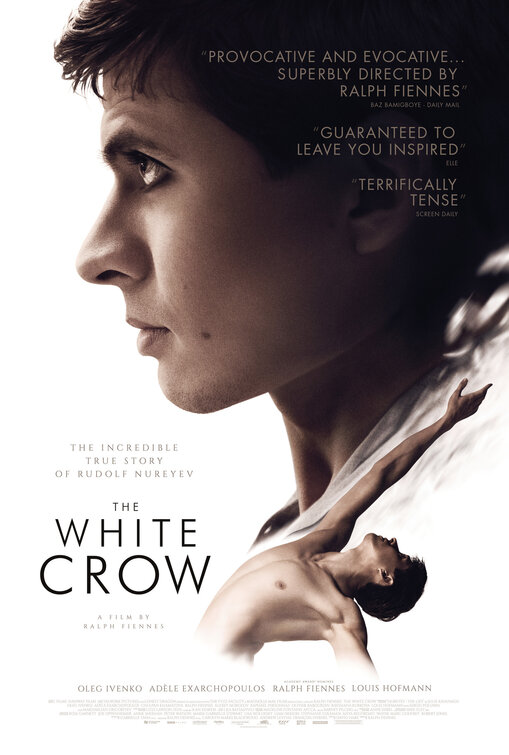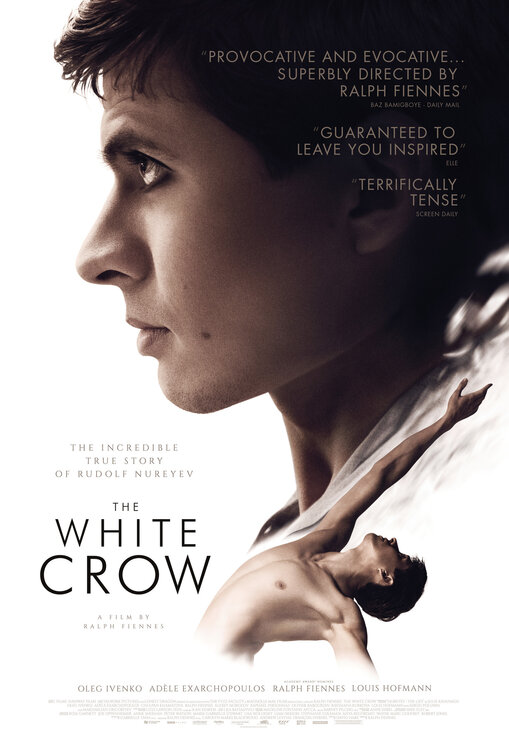
![]() The White Crow could be about anything. The cryptic title is explained in the very first frame. It’s a Russian term for someone “unusual, extraordinary, not like others, an outsider.” I suppose I should realize by now that color + bird = ballet movie. Black Swan and Red Sparrow also wove the same discipline into its storyline.
The White Crow could be about anything. The cryptic title is explained in the very first frame. It’s a Russian term for someone “unusual, extraordinary, not like others, an outsider.” I suppose I should realize by now that color + bird = ballet movie. Black Swan and Red Sparrow also wove the same discipline into its storyline.
The White Crow concentrates on famed dancer Rudolf Nureyev (Oleg Ivenko) during his young adulthood. Most acknowledge him as the greatest male ballet artist of his generation. He was also the first major Soviet artist to defect to the West during the Cold War. This contemplative film leisurely advances towards a captivating conclusion. The account depicts his humble birth on a moving train in 1938, becoming a sensation with the Kirov Ballet (now known as the Mariinsky) in the late 1950s and the rising acclaim surrounding his early career.
These episodes aren’t depicted in order but rather shifting back and forth. I’ve often felt that haphazard embellishments are utilized when a director doesn’t have enough faith in his tale to tell it in a normal fashion. As if chronological order is too conventional. However, the drama’s clarity is obfuscated by this narrative device as I was often unclear whether certain events occurred earlier or later. Rudolf Nureyev was a man with a fascinating story. To wit, most of the focus is on a fateful 6 week trip to Paris with the Kirov Ballet in 1961. The developments of his life would certainly make an interesting production without the stylistic devices employed here.
Written by two-time Oscar nominee David Hare (The Hours, The Reader) and directed by also twice Oscar-nominated actor Ralph Fiennes, this biopic has prestige oozing from every cinematic pore. Hare was inspired by Julie Kavanagh’s book: Rudolf Nureyev: The Life. Nureyev was a temperamental man and director Ralph Fiennes doesn’t attempt to make his subject likable. Fiennes also appears in a small role as Alexander Pushkin, Nureyev’s teacher and mentor in Leningrad. The cast also benefits from the presence of Adèle Exarchopoulos (Blue Is the Warmest Color), who portrays Clara Saint, a 21-year old French woman who ends up playing a key element in Nureyev’s personal revolt.
Rudolf Nureyev’s mercurial character is highlighted by first-time actor, Oleg Ivenko, a real-life Ukrainian ballet dancer. There are brief snippets showcasing his prowess but little in the way of performances. I wanted to see more of that talent and less brooding. Ivenko does a good job at conveying his rebellious mood, however. Nureyev is not a warm person but that’s not required to enjoy this movie. The saga ultimately builds to a memorable scene with a mesmerizing climax. While Nureyev’s ballet troupe was to continue on to London, he was being summoned back to Moscow. The real reason is unclear but his arrogant disdain for company regulations certainly played a part. The request was enough to send him into hysterics. The defection is a seemingly impulsive decision that makes perfect sense. If only it didn’t take so long to get there. At 127 minutes, the film’s distended length doesn’t do its subject any favors. Some thoughtful editing would improve the drama immeasurably. Chop 20 minutes out and just get to the “pointe”.
05-16-19

Leave a comment